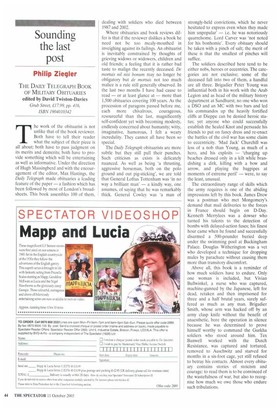Sounding the last post
Philip Ziegler
THE DAILY TELEGRAPH BOOK OF MILITARY OBITUARIES edited by David Twiston-Davies Grub Street, E17.99, pp. 416, ISBN 1904010342 The work of the obituarist is not unlike that of the book reviewer. Both have to tell their reader what the subject of their piece is all about; both have to pass judgment on its merits and demerits; both have to provide something which will be entertaining as well as informative. Under the direction of Hugh Massingberd and with the encouragement of the editor, Max Hastings, the Daily Telegraph made obituaries a leading feature of the paper — a fashion which has been followed by most of London's broadsheets. This book assembles 100 of them,
dealing with soldiers who died between 1987 and 2002.
Where obituaries and book reviews differ is that if the reviewer dislikes a book he need not be too mealy-mouthed in inveighing against its failings. An obituarist is inevitably constrained by thoughts of grieving widows or widowers, children and old friends; a feeling that it is rather bad taste to malign the recently deceased. De mortuis nil nisi boo urn may no longer be obligatory but de mortuis not too much malice is a rule still generally observed. In the last two months I have had cause to
read — or at least glance at more than 1,500 obituaries covering 100 years. As the procession of paragons passed before me, each more chivalrous, courageous, resourceful than the last, magnificently self-confident yet with becoming modesty, endlessly concerned about humanity; witty, imaginative, humorous, I felt a weary incredulity. They cannot all have been so special.
The Daily Telegraph obituarists are more subtle but they still pull their punches. Such criticism as exists is delicately nuanced. As well as being 'a thrusting, aggressive horseman, both on the polo ground and out pig-sticking', we are told that General Loftus Tottenham was 'in no way a brilliant man' — a kindly way, one assumes, of saying that he was remarkably thick. General Cowley was 'a man of strongly-held convictions, which he never hesitated to express even when they made him unpopular' — i.e. he was notoriously quarrelsome. Lord Carver was 'not noted for his bonhomie'. Every obituary should be taken with a pinch of salt; the merit of these is that the smallest of pinches will suffice.
The soldiers described here tend to be either nobs, heroes or eccentrics. The categories are not exclusive; some of the deceased fall into two of them, a handful are all three. Brigadier Peter Young was influential both in his work with the Arab Legion and as head of the military history department at Sandhurst; no one who won a DSO and an MC with two bars and led his commandos up the heavily fortified cliffs at Dieppe can be denied heroic status; yet anyone who could successfully establish the Sealed Knot and persuade his friends to put on fancy dress and re-enact the battles of the civil war has some claim to eccentricity. 'Mad Jack' Churchill was less of a nob than Young, as much of a hero, and his exploits — 'charging up beaches dressed only in a kilt while brandishing a dirk, killing with a bow and arrow, and playing the bagpipes at moments of extreme peril' — were, to say the least, unusual.
The extraordinary range of skills which the army requires is one of the abiding impressions left by this book. James Drew was a postman who met Mongomery's demand that mail deliveries to the forces in France should begin on D-Day. Kenneth Merrylees was a dowser who turned his talents to the detection of bombs with delayed-action fuses; his finest hour came when he found and successfully disarmed a 500-pounder buried deep under the swimming pool at Buckingham Palace. Douglas Witherington was a vet who developed a technique for dropping mules by parachute without causing them more than transitory discomfort.
Above all, this book is a reminder of how much soldiers have to endure, Only one woman is included, but Vivian Bullwinkel, a nurse who was captured, machine-gunned by the Japanese, left for dead, retaken and then imprisoned for three and a half brutal years, surely suffered as much as any man, Brigadier Smith, whose arm was hacked off by an army clasp knife without the benefit of anaesthetic, bore the operation in silence because he was determined to prove himself worthy to command the Gurkha soldiers who stood around him. Tex Banwell worked with the Dutch Resistance, was captured and tortured, removed to Auschwitz and starved for months in a six-foot cage, yet still refused to betray his contacts. Almost every obituary contains stories of stoicism and courage: to read them is to be convinced of the wastefulness of war, but also to recognise how much we owe those who endure such tribulations.


















































































 Previous page
Previous page